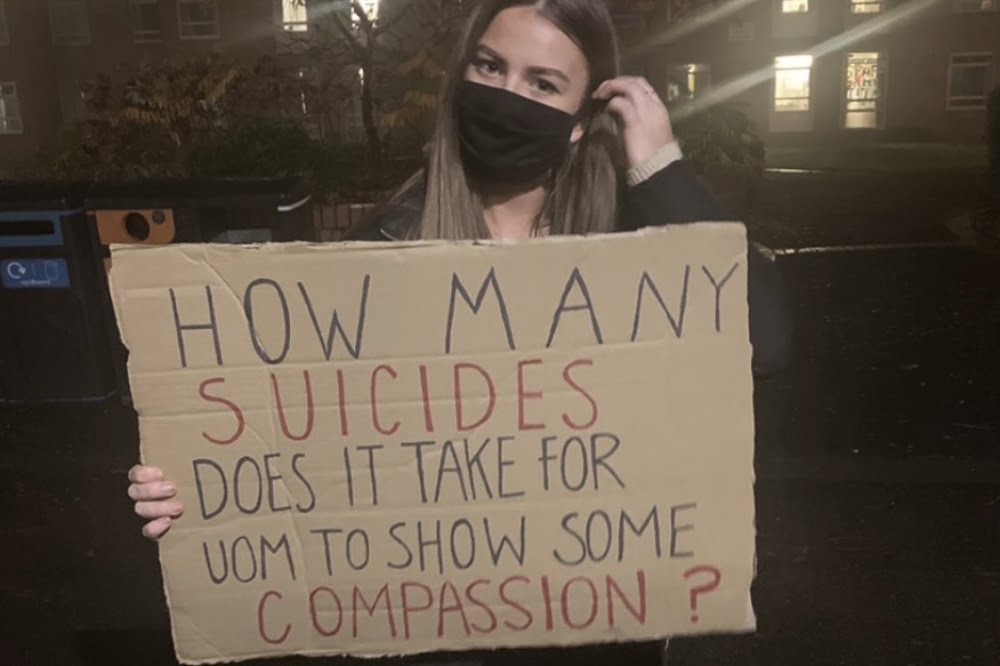Faced with ever-increasing pressures, many students are turning to drugs as a palliative for conditions such as anxiety and depression. Draconian policies will not help. We need socialist solutions to society’s mental health crisis.
Four young people in Northumbria passed away last month from what is suspected to be a contaminated batch of drugs. Of these, three were students at Northumbria and Newcastle universities.
In light of this tragedy, students have called for the university to re-examine its punitive drug policy and focus on a harm reduction approach. This raises important questions about drug taking behaviour amongst students.
Vicious circle
 In 2018, a study by the National Union of Students (NUS) looked into student drug taking. This was the largest ever cross-campus investigation into this subject. The results provide a great deal of insight.
In 2018, a study by the National Union of Students (NUS) looked into student drug taking. This was the largest ever cross-campus investigation into this subject. The results provide a great deal of insight.
39% of respondents stated that they currently used drugs. A further 17% had used drugs at some point. In total, then, around 56% of students had taken drugs at some point.
Why do so many students feel the need to turn to drugs? 31% of respondents disclosed that they used drugs to cope with stress. 22% said that they were self-medicating for pre-existing mental health conditions. It is clear, therefore, that there is a strong connection between drug taking and mental health.
This problem is not unique to students. Previous studies have identified a link between drug use and an unmet need for mental health care in adults.
In such circumstances, self-medication leads to a vicious circle. Substances are taken to bring about a qualitative change in mood. This process is repeated in order to bring further relief from the unpleasant mood. But drug consumption itself often worsens mental health. It can also lead to long-term damage, as well as triggering the onset of new conditions.
Societal problem
 There is a serious mental health crisis in society – one that has been created and exacerbated by the pressures of capitalism. This is felt particularly strongly amongst young people and students.
There is a serious mental health crisis in society – one that has been created and exacerbated by the pressures of capitalism. This is felt particularly strongly amongst young people and students.
There are many factors that have a deteriorating influence on mental health. And these all become more potent as the crisis of capitalism worsens.
With every passing day, our futures are becoming more precarious. For workers, job prospects, wages, and conditions are all becoming more unstable. Many students, meanwhile, are facing up to the reality that years spent studying – with tens of thousands accumulated in debt – might all be for nothing.
The welfare state is being destroyed. A draconian universal credit system is being imposed on the vulnerable. Financial hardship is rife. All of these are significant contributors to the growing prevalence of mental health problems in society.
Furthermore, a new phenomenon has emerged: climate anxiety – clinically significant anxiety in response to the climate crisis.
Today’s youth are overflowing with uncertainty, expressed in terms of acute anxiety, stress, and depression. Is it any wonder that there is a mental health crisis?
Privatisation and cuts
 We encounter further problems when looking at access to treatment. For example, students are often encouraged to turn to wellbeing services when facing a crisis. The NUS survey revealed, however, that 40% of respondents do not feel able to disclose information regarding drug use, due to fear of punishment; they therefore do not consider this to be a viable option.
We encounter further problems when looking at access to treatment. For example, students are often encouraged to turn to wellbeing services when facing a crisis. The NUS survey revealed, however, that 40% of respondents do not feel able to disclose information regarding drug use, due to fear of punishment; they therefore do not consider this to be a viable option.
Student wellbeing services also fall short in providing effective mental health care. Such services are only able to handle mild cases, and are unable to provide diagnoses. They are often criticised for focusing on broader wellbeing over mental health. Often students with more complex mental health conditions are turned away and told to see their GP instead. This often leaves students feeling that they are ‘too far gone’ to receive treatment.
Contacting a GP is often not a viable option either, due to the increased privatisation of the NHS and the systematic underfunding of mental health services, which are failing to meet a growing demand.
A 2018 investigation into wait times discovered patients with severe mental health issues waiting between 6-12 months for treatment. These are vulnerable layers of society who are at risk from an array of harmful coping behaviours, and who are in danger of turning to drugs to self-medicate.
Often the only solution for receiving essential treatment and skipping months-long waiting lists is privatised therapy. But this is a luxury that is out of reach for most. Students cannot afford to pay for private treatment on student loans, and working class families struggle to fund this.
This is why workers and students must organise to fight against Tory cuts and privatisation in the NHS, so that those in crisis have access to proper mental health services with far shorter waiting times.
With accessible and properly funded mental health services, the most vulnerable layers of society would not be forced to turn to self-medication in the first place.
Control of campus
 It has been repeatedly demonstrated that educational achievement is connected with mental health. We must therefore demand real and effective support from university wellbeing services so that students are not forced to self-medicate with drugs.
It has been repeatedly demonstrated that educational achievement is connected with mental health. We must therefore demand real and effective support from university wellbeing services so that students are not forced to self-medicate with drugs.
This means student unions calling for universities to scrap draconian policies on drug use, so that students feel that they can turn to wellbeing services for support. Instead, universities should focus on harm reduction, distributing information on harmful combinations and drug testing kits to reduce student drug related deaths.
Most drug related deaths are associated with a lack of education on drugs. The ‘just say no’ policy is outdated and fatal. Only when we address this will students feel able to turn to the university for the support they need.
To do this, however, requires a transformation in the relationship between students and universities. Unelected university managers and bureaucrats are not accountable to students and staff, but are only interested in money making.
This has been shown clearly by the current COVID fiasco in universities. If university management cared for students’ mental health, then why would they lull young people to campuses under false pretences, where they would then spend weeks locked up and isolated? Because, in reality, the only thing the university bosses care about is grabbing fees and rents from students!
We need universities to be run by staff, student representatives, and the wider working class. Only on this basis can beneficial and effective policies be developed and implemented to tackle drug use and mental health problems.
Socialist change
 Socioeconomic status and income should not be a predictor of ill mental health. With decent jobs, wages, and working conditions – alongside well-funded public services and a welfare system fit for purpose – this wouldn’t be the case.
Socioeconomic status and income should not be a predictor of ill mental health. With decent jobs, wages, and working conditions – alongside well-funded public services and a welfare system fit for purpose – this wouldn’t be the case.
But capitalism cannot guarantee any of these things. Instead, we are plunged into wave after wave of crisis, like a loose buoy caught in a storm.
Only by offering people a stable and prosperous future can we quell the mental health epidemic. Such prospects are impossible within the capitalist system, however, which forces workers and youth into an ever-increasing race to the bottom.
This is why we must fight to transform society as a whole, not just campuses. Only in a socialist society – free from the pressures of profit – will this devastating problem be solved.






